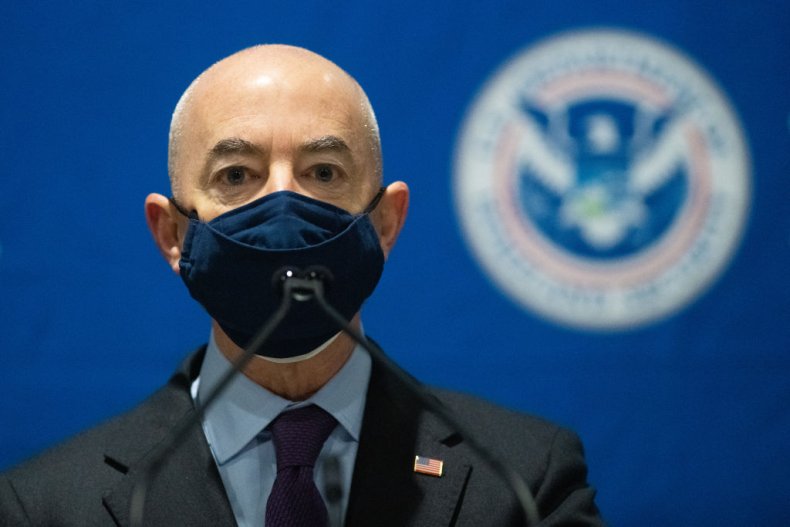Activists, Who Fear Border Woes Will Undercut Their Agenda, Demand Meeting With Mayorkas
It used to be easy to get access to Alejandro Mayorkas.
During Obama's second term in 2012 and 2013, immigration activists met weekly with the former director of U.S. Citizenship and Immigration Services (USCIS) at his behest in the run-up to the implementation of the DACA program, which allows young immigrants to remain in the U.S. and work legally.
"The relationship was not always friends," said Cristina Jimenez, the co-founder of United We Dream, describing "pressure, difficult meetings, and tension," but ultimately the dialogue was "fruitful" and "productive."
Times have changed.
Now Mayorkas is the secretary of the Department of Homeland Security (DHS), tasked with getting his arms around a brewing influx of unaccompanied children arriving at the border amid bipartisan sniping over the Biden administration's handling of the issue.
Advocates said they are struggling to meet with Mayorkas to discuss their pressing agenda items and issues with DHS policy they believe are at risk of being swamped by the situation at the border. At stake are urgent conversations to be discussed about the implementation of interior enforcement policies that decide who is a priority for deportation and who can stay for now, and detention conditions during a global pandemic that endanger the lives of immigrants who are not a threat to anyone.
Mijente, a national grassroots group, hopes to change that dynamic by publicly calling on Mayorkas to meet with them and listen to the stories of immigrants affected by his agency's policies. In a letter provided to Newsweek and signed onto by other top organizations, the group invited him to a virtual national town hall meeting on May 3 called "Eyes on ICE: Truth and Accountability Forum."
"Accountability" is the key word for the group, which is tying the invitation to the announced review of immigration enforcement and removal policies and priorities initiated by Biden on January 20. An interim memo on enforcement was sent February 18 that activists widely saw as worse because it made more people priorities for deportation, and Mayorkas is set to publish new rules for ICE officers within 90 days of the updated memo.
"What is most important for us is the commitment to review enforcement practices," senior Mijente organizer Jacinta Gonzalez told Newsweek, "and we're firm in the belief that a review is going to be incomplete if it does not include the voices of people directly impacted."
Other advocates who spoke with Newsweek said it is their strong sense that Mayorkas is being shielded by lawyers and officials within the agency to protect him from the policy demands of advocates.
Julie Mao, the deputy director of Just Futures Law in Washington, said that accountability is needed for DHS leadership to step in on deportation priorities and issues— like the way local policing and racial profiling impacts Black and Brown immigrants and "becomes a justification for people's deportation"—and cooperation between ICE agents and local law enforcement, known as the Secure Communities program.
But while meeting with Mayorkas is the ultimate goal, some groups have been successful in taking their case to other DHS officials. The National Immigrant Justice Center is meeting with DHS this week, according to a source familiar with its planning. While the group declined to confirm the meeting, it is currently dealing with client issues that the agency could singlehandedly improve and provide clarity on.
For example, there is currently no workable ICE case review process for people who want to flag that they are not a priority for removal. There are also certain types of individuals—such as survivors of sex trafficking, transgender people who often become targets of violence, and immigrants with co-morbidities who are high risk for the coronavirus—who the group says should not be in detention. One case involves an immigrant in custody who is facing a leg amputation and wants to be with his family during the interim.
Frank Sharry, the executive director of America's Voice, and a veteran immigration activist of the last two decades, said that he has found Mayorkas and his team accessible to advocates since the transition, with border groups invited to calls and meetings as Trump-era policies were wound down and replaced. But he acknowledged Mayorkas has been "a little consumed" by the situation at the border in recent weeks.
"Generally speaking I find them much more accessible than previous administrations, and I include the Obama administration in that," he said.
Still, he underscored the reason activists are pushing for more access before the first 100 days of Biden's presidency are up is because they want to "keep the focus on interior enforcement issues."
"I call on the secretary to meet with them, you have to be able to work on more fronts than one, while there's a media frenzy about the so-called border crisis," he added.
One White House ally who was not authorized to speak publicly took a different view, saying that "out of everything that has been a dumpster fire" on immigration, "Mayorkas has been a pretty steady leader through all of this."
"I don't know that it makes sense to attack someone that is ostensibly on your side," the source said.
Calls to meet with and pressure Mayorkas stem from an early decision that with the White House scrambling to get up and running and assailed on all sides on the border, a grace period was fair. But that has now come to an end as well, activists told Newsweek.
One source trying to work through immigration issues with the administration found a "commonality" between the media's spotlight on the situation at the border and the way "political appointees" like Mayorkas are handling the rest of a complex, robust immigration system.
"With negligence to the detention system and immigrants who are already here," the source said.


